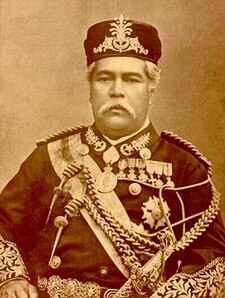| Abu Bakar أبو بكر | |||||||||
|---|---|---|---|---|---|---|---|---|---|
 Sultan Abu Bakar of Johor | |||||||||
| Sultan of Johor | |||||||||
| Reign | 13 February 1886 – 4 June 1895 | ||||||||
| Coronation | 29 July 1886 | ||||||||
| Predecessor | Sultan Ali Iskandar Shah | ||||||||
| Successor | Sultan Ibrahim | ||||||||
| Chief Minister | Jaafar Muhammad | ||||||||
| Maharaja of Johor | |||||||||
| Reign | 30 June 1868 – 12 February 1886 | ||||||||
| Predecessor | Daeng Ibrahim Maharaja of Johor (de facto) | ||||||||
| Successor | (post abolished) Sultan of Johor | ||||||||
| Temenggong of Johor | |||||||||
| Reign | 2 February 1862 – 29 June 1868 | ||||||||
| Predecessor | Daeng Ibrahim | ||||||||
| Successor | (post abolished) Maharaja of Johor | ||||||||
| Born | 3 February 1833 Istana Lama, Teluk Belanga, Singapore, Straits Settlements | ||||||||
| Died | 4 June 1895 (aged 62) Bailey's Hotel, South Kensington, London, United Kingdom | ||||||||
| Burial | 7 September 1895[1] | ||||||||
| Spouse |
| ||||||||
| Issue |
| ||||||||
| |||||||||
| House | Temenggong of Johor | ||||||||
| Father | Maharaja Tun Daeng Ibrahim bin Temenggong Tun Daeng Abdul Rahman | ||||||||
| Mother | Cik' Ngah[citation needed] | ||||||||
| Religion | Sunni Islam | ||||||||
Sultan Sir Abu Bakar Al-Khalil Ibrahim Shah ibni Almarhum Maharaja Tun Daeng Ibrahim GCMG KCSI (Jawi: المرحوم سلطان سر أبو بكر الخليل إبراهيم شاه ابن المرحوم تمڠڬوڠ تون داءيڠ إبراهيم سري مهاراج جوهر; 3 February 1833 – 4 June 1895)[citation needed] was the Temenggong of Johor. He was the 1st sultan of modern Johor, the 21st Sultan of Johor and the first Maharaja of Johor from the House of Temenggong.[3][fn 2] He was also informally known as "The Father of Modern Johor", as many historians accredited Johor's development in the 19th century to Abu Bakar's leadership. He initiated policies and provided aids to ethnic Chinese entrepreneurs to stimulate the development of the state's agricultural economy which was founded by Chinese migrants from southern China in the 1840s.[4] He also took charge of the development of Johor's infrastructure, administrative system, military and civil service, all of which were modelled closely along Western lines.[5]
Abu Bakar was noted for his diplomatic skills, and both the British and Malay rulers had approached him for advice in making important decisions. He was also an avid traveller, and became the first Malay ruler to travel to Europe during his first visit to England in 1866. In particular, Abu Bakar became a lifetime friend of Queen Victoria in his later years. Abu Bakar's friendship with Queen Victoria played an important role in shaping Johor's relationships with Britain, and was the only state by the end of the 19th century in the Peninsular Malaya to maintain autonomy in its internal affairs as the British Colonial Government pushed for greater control over the Malay states by placing a British Resident in the states. He was also an Anglophile, and many of his personal habits and decisions were aligned to European ideas and tastes.
Abu Bakar became the sovereign ruler of Johor when his father, Temenggong Daeng Ibrahim died in 1862. Six years later, Abu Bakar changed his legal state title of "Temenggong" to "Maharaja". In 1885, Abu Bakar sought legal recognition from Britain for another change in his legal state title of "Maharaja" to a regal title of "Sultan", and was proclaimed the following year. In all, Abu Bakar's reign lasted for 32 years until his death in 1895.[6]
- ^ Cite error: The named reference
Winstedt137was invoked but never defined (see the help page). - ^ Dewan Bahasa dan Pustaka, Kementerian Pelajaran, Dewan Sastera, pg 14
- ^ Section B Planning and Implementation, Part 3 Physical Planning Initiatives, CHAPTER 13, Johor Bahru City Centre Archived 27 February 2009 at the Wayback Machine, ISKANDAR MALAYSIA, pg 6, "....This was followed later by the 21st Sultan of Johor – Sultan Abu Bakar (1862–1895) who laid the foundation for developing Johor into a modern state. ..."
- ^ (五)陈旭年与柔佛新山[permanent dead link], 新山中华公会 (Johor Chinese Association). Retrieved 28 April 2009
- ^ Cite error: The named reference
Andaya152was invoked but never defined (see the help page). - ^ Ismail, Fauziah, He is a ‘Datuk’... but it’s not ‘Sir Shahrukh’, 14 December 2008, New Straits Times, JohorBuzz
Cite error: There are <ref group=fn> tags on this page, but the references will not show without a {{reflist|group=fn}} template (see the help page).